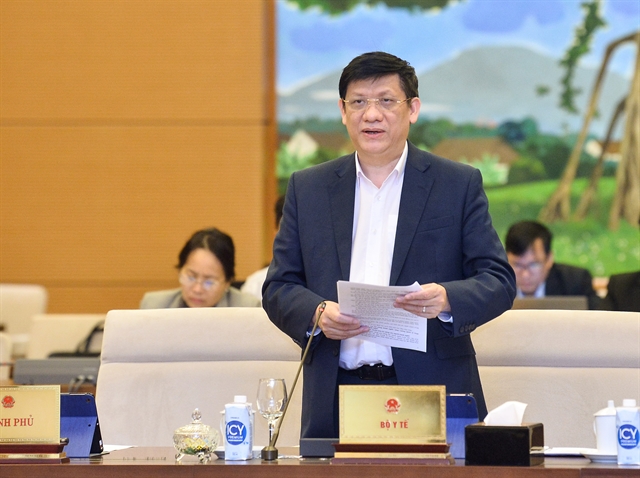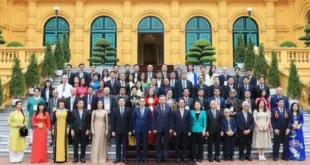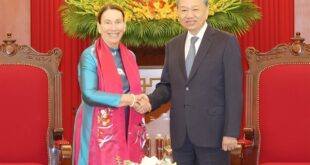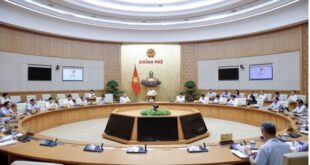
HÀ NỘI — Lawmakers have been discussing ways to reduce overloading at hospitals, ensure transparency and financial autonomy and, keep health workers away from the risk of violating medical ethics.
The National Assembly (NA) Standing Committee yesterday discussed the draft law on Medical Examination and Treatment (amended).
Presenting the draft, Minister of Health Nguyễn Thành Long said that the 2009 law created an extremely important legal corridor for medical examination and treatment.
It standardised the quality of medical examination and treatment activities, increased people’s access to medical examination and treatment services, step by step improve the quality of medical examination and treatment service provision, and created a legal corridor for Vietnamese medicine to have access to new, methods and advanced medical techniques.
But now, there are a number of issues that are causing concern, requiring amendments to be made.
“After more than 11 years, problems and inadequacies have arisen as there are no sufficient legal mechanisms to solve,” Long said.
The amended law, he said, must look at applying new techniques in medical examinations at all levels, settle complaints, and disputes quickly, and reduce errors made by medical staff.
It must also pinpoint ways to better respond to natural disasters, and catastrophes and be prepared in the event of the spread of group A infectious diseases.
The minister said all suggestions for the amendments must prioritise patient care, and increase access to high-quality services and, continue to implement the policy of socialisation and diversification of medical services with the active participation of professional associations, practitioners and patients.
Long said that the amendments were made to better ensure the fairness between state-owned and private medical examination and treatment establishments; renovate mechanisms to ensure the rights and responsibilities of patients, medical examination and treatment establishments, and healthcare practitioners.
The draft also focused on speeding up the reform of administrative procedures and application of information technology in medical examination and treatment activities; ensuring the constitutionality, legitimacy, consistency, synchronism, feasibility, compliance with international law on medical examination and treatment, and ensure the element of gender equality.
The use of the Health Insurance Fund for preventive medical examination and treatment activities such as cancer screening would be included in the Law on Health Insurance.
Chairman of the NA’s Social Affairs Committee Nguyễn Thuý Anh said the contents of the draft law included policies relating to administrative procedures and impacted stakeholders in many ways.
“It is recommended that the drafting agency need to further evaluate the impacts of these policies, particularly those relating to the investment and business environment, the socialist-oriented market economy institution, and the requirements of international integration,” she said.
She also said that sensitive policies related to foreign factors should continue to be consulted by associations and the business community who are affected by the policy. At the same time, it is necessary to supplement the assessment of the impacts of the COVID-19 pandemic on the feasibility of the proposed policies.
Anh said that new or added contents in the draft law led to changes in administrative procedures and affected healthcare practitioners, medical examination and treatment facilities, and patients.
National Assembly Chairman Vương Đình Huệ said that the draft updated and supplemented many new issues arising in the field of medical examination and treatment, especially in the context of the COVID-19 pandemic.
Huệ said that once passed, the amended law must help to prevent the overuse of science and technology in testing that push service prices much higher than the affordability of the vast majority of people like the phenomenon seen in some countries in the world.
The law was also expected to curb the overloading at hospitals of higher levels; ensure publicity, transparency, and financial autonomy in the health sector, keep health workers away from the risk of violating medical ethics and commercialisation in the medical field; ensure clarity and transparency for parties involved in medical examination and treatment activities, he said.
Chairman of the Finance-Budget Committee Nguyễn Phú Cường said that under the draft law, before surgery and surgical intervention, the patient’s representative must submit a written agreement. While in Article 32 of the draft law, medical examination and treatment practitioners are entitled to decide and take responsibility for the diagnosis and treatment methods within the scope of their professional activities.
He added that in many cases of minor surgery, patients also had to sign a commitment saying that the patients were fully responsible if there were any problems with their health.
“In most cases, the patient and family are required to sign this commitment to have the surgery performed,” Cường said, calling for more study and supplement regulations to increase the responsibilities of medical examination and treatment practitioners to protect the health and interests of patients. VnExpress News
- Reduce Hair Loss with PURA D’OR Gold Label Shampoo
- Castor Oil Has Made a “Huge” Difference With Hair and Brow Growth
- Excessive hair loss in men: Signs of illness that cannot be subjective
- Dịch Vụ SEO Website ở Los Angeles, CA: đưa trang web doanh nghiệp bạn lên top Google
- Nails Salon Sierra Madre
 VnExpress News The News Gateway of Vietnam
VnExpress News The News Gateway of Vietnam





